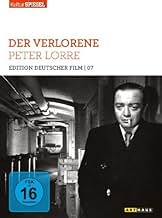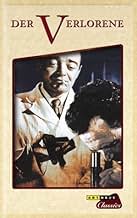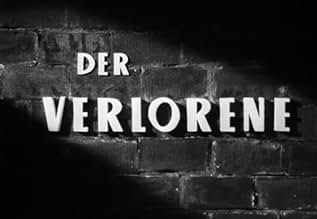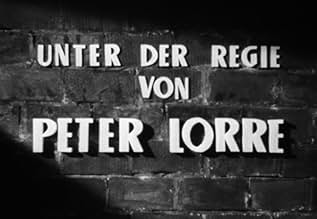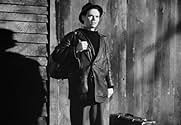IMDb RATING
7.0/10
1.2K
YOUR RATING
German scientist murders his fiancée during World War II when he learns that she has been selling the results of his secret research to the enemy.German scientist murders his fiancée during World War II when he learns that she has been selling the results of his secret research to the enemy.German scientist murders his fiancée during World War II when he learns that she has been selling the results of his secret research to the enemy.
- Awards
- 1 win & 1 nomination total
Helmuth Rudolph
- Colonel Winkler
- (as Helmut Rudolph)
Eva Ingeborg Scholz
- Ursula Weber
- (as Eva-Ingeborg Scholz)
Peter Ahrweiler
- Oberstleutnant Marquardt
- (uncredited)
Josef Dahmen
- Lieske, canteen bartender
- (uncredited)
Helmut Eichberg
- Oberstleutnant Bydersahn
- (uncredited)
Kurt Fuß
- Baldheaded Man
- (uncredited)
Joachim Hess
- Leutnant
- (uncredited)
Richard Münch
- Criminal Inspector #1
- (uncredited)
Featured reviews
This unique German noir is a weird film, to say the least. A doctor at a vaccination clinic makes an interruption in his work, when another doctor comes there to assist him, who is a dark shadow out of his past. During the war he was a researcher achieving great findings and results, and that suddenly appearing man was his assistant, stealing his research results and selling them to the enemy, using his betrothed for a bait, so he stole both his work and his fiancée. Peter Lorre is the doctor who can't forgive his betrothed for her treason, so he strangles her in the most sensitive scene of the film (without showing the strangulation - it is only reported afterwards,) and from that moment on he is a lost man. All this is shown in flashbacks, as Lorre has a long talk with his old colleague while drinking and smoking, sorting things out, to reach a settlement. The film and the story is complicated, the flashbacks are confusing, the story involves both Nazi plots, bombings of Hamburg, another improvised murder, proving the liability of the psychopath Peter Lorre has grown into, and everything is draped in very dark shadows and abysmal moods, the character of the film is apocalyptic, and shadows play an important part in the cinematography. It is fascinating and weird, deeply disturbing and melancholy at the same time, poignantly pinpointing the mood of post war Germany among the ruins of both Hamburg and people, in a world where no one can feel at home or safe or any security any more.
Following a period of rehabilitation where he managed to beat his addiction to morphine, character actor extraordinaire Peter Lorre felt confident enough not only to leave his secure employment as a lean, sleek villain in myriad Hollywood noirs and go back to his native Germany after almost 20 years (which, like many compatriots, he had fled when the Nazis came to power) but also to embark on his sole foray behind the camera. Adopting an unfussy technique but a compelling flashback structure, Lorre turned out a truly remarkable piece of work that, equally unsuccessful on its first release as Charles Laughton's THE NIGHT OF THE HUNTER (1955) and Marlon Brando's ONE-EYED JACKS (1961), has yet to have its somewhat maligned reputation vindicated in the same unequivocal manner as these two 'one-hit wonders' by actors-turned-directors. A chubbier, infinitely world-weary Lorre gives a haunting central performance as the dedicated, real-life scientist Dr. Karl Rothe who, being told by his superiors that his discoveries were being passed on to the allied forces by his beautiful (and much younger) fiancée, strangles her in a moment of silent rage upon returning to the lodgings he shares with his mother-on-law and her cat; the actress playing Lorre's first victim (Renate Mannhardt) makes such an indelible impression on the spectator that, upon a second viewing, one is surprised to discover how brief her appearance in the film actually is. Changing his identity and now serving as a medical doctor in a refugee camp, Lorre is brought once again face to face with his inner demons in the shape of his assistant during WWII who, apart from having carried on an affair with Lorre's wife, was secretly also an important Party official investigating the infamous "Night Of The Long Knives" conspiracy (which is rather murkily dealt with in the film's latter stages); another enigmatic aspect of Lorre's personality that is somewhat oddly thrown into the mix is his troubled dealings with other women over the years, culminating in another murder committed in a stationary train carriage. Interestingly, the film opens with a shot of a moving train out of which emerges the tiny figure of Lorre walking towards the refugee camp and ends in a devastating medium shot of Lorre, one hand clasped dejectedly to his face, standing stationary on the railroad tracks as a locomotive rushes headlong in his direction! As one can surmise from this synopsis, THE LOST ONE's lack of critical and commercial success ought to be attributed more to its utter grimness and thoroughly defeatist view of post-war Germany than to any jinx the production might have been vested with (the film's producer, Arnold Pressburger, died in mid-production, the original negative was lost in an editing suite fire and the film survives via a reconstructed print, etc.) and, indeed, should be much better known even among film connoisseurs. Personally, I had first come across a copy of the film at a priceless DVD rental store on Santa Monica Blvd. in Hollywood in January 2006 but I have since added it to my collection in a seemingly restored version (albeit sporting distractingly ungrammatical English subtitles).
So heavy and so depressing, as any post-World War II German film - with flashbacks - would be.
Peter Lorre, in real life addicted to morphine, came out of rehab and returned to Germany, where he directed and starred in a film, The Lost Man, in 1951.
Lorre is a scientist, Dr. Karl Rothe, who after the war was presumed dead and therefore was able to change his name to Neumeister. During the Nazi era, he learns from those over him that his discoveries are being sold to the enemy - by his fiancee.
In a rage, he strangles her. Now he works as a doctor in a refugee camp, but is reminded of his past in the presence of the man who was his assistant during the war, Hosch, who was involved in the investigation of The Night of the Long Knives.
The "Night Of The Long Knives" was a series of political extrajudicial executions intended to consolidate Hitler's power and alleviate the concerns of the German military about the role of Ernst Röhm and the Sturmabteilung (SA), the Nazis' paramilitary organization, known colloquially as "Brownshirts."conspiracy.
That Neumeister has become completely unstable is demonstrated not only in his narration of the flashback, in which he tells Hosch that he intended to kill him, but in his problems with women. At one point, he murders a woman while on a train.
Lorre did a magnificent job in both his acting and direction. The end of the film is just as miserable as the rest of it. It's powerful, but don't have any sharp objects in the house.
Peter Lorre, in real life addicted to morphine, came out of rehab and returned to Germany, where he directed and starred in a film, The Lost Man, in 1951.
Lorre is a scientist, Dr. Karl Rothe, who after the war was presumed dead and therefore was able to change his name to Neumeister. During the Nazi era, he learns from those over him that his discoveries are being sold to the enemy - by his fiancee.
In a rage, he strangles her. Now he works as a doctor in a refugee camp, but is reminded of his past in the presence of the man who was his assistant during the war, Hosch, who was involved in the investigation of The Night of the Long Knives.
The "Night Of The Long Knives" was a series of political extrajudicial executions intended to consolidate Hitler's power and alleviate the concerns of the German military about the role of Ernst Röhm and the Sturmabteilung (SA), the Nazis' paramilitary organization, known colloquially as "Brownshirts."conspiracy.
That Neumeister has become completely unstable is demonstrated not only in his narration of the flashback, in which he tells Hosch that he intended to kill him, but in his problems with women. At one point, he murders a woman while on a train.
Lorre did a magnificent job in both his acting and direction. The end of the film is just as miserable as the rest of it. It's powerful, but don't have any sharp objects in the house.
After years of dreary labor in Hollywood as a professional "evil foreigner," Lorre went home to Germany to write, direct and star in this dark, dreamlike narrative in which he plays the ultimate Peter Lorre character: a Nazi mad doctor sex murderer. The film is an ironic commentary by Lorre, the reluctant impersonator of psychopaths, on the nature of true psychopathology as embodied in the amoral Nazi regime. It's also an ingenious melding of the sort of B-film noir that Lorre had specialized in for years as an actor (Maltese Falcon, Stranger on the Third Floor, Quicksand) and the impressionistic Nouvelle Roman/Nouvelle Vague influenced art film just picking up steam on the continent (shades of Orpheus, Wild Strawberries, and Last Year at Marienbad can be seen in its shadowy enfolding of past/present and dream/reality.) Though somewhat uncertain in balancing himself between his roles as principal actor and director (the motivations of some of the other characters are somewhat murky, for instance, and it's rather a shock to see Peter Lorre so continually being the object of women's lustful attentions) this was clearly a man with the makings of an ingenious and original filmmaker. It's a shame this film isn't better known, and that Lorre never got the chance to make another.
After eighteen years in exile Peter Lorre returned to the land of his birth for his one and only stab at directing. Based upon a newspaper article about a doctor who had killed his assistant and then stepped in front of a train, Lorre has fashioned a screenplay with the help of novelist Benno Vigny and esteemed director Helmut Kautner.
Like so many actors who take up directing he is very generous to his players and in particular allows his five actresses to shine. Individual scenes are extremely effective but these alas are achieved at the expense of overall structure. Despite oodles of atmosphere from superlative lighting cameraman Vaclav Vich, the film is weakened by a verbose script and an intrusive, over-orchestrated score. Suffice to say Lorre is riveting as Dr. Rothe but the entire enterprise required a firmer hand at the helm.
This is a film that Lorre evidently felt compelled to make but this bleak allegory of Germany's fatal flirtation with National Socialism and the nation's collective guilt in the person of a serial murderer was hardly likey to be welcomed by audiences of the time and such proved to be case.
That it has a haunting quality is undeniable and remains, in the words of David Thomson, "a direct imprint of a very troubled soul."
Like so many actors who take up directing he is very generous to his players and in particular allows his five actresses to shine. Individual scenes are extremely effective but these alas are achieved at the expense of overall structure. Despite oodles of atmosphere from superlative lighting cameraman Vaclav Vich, the film is weakened by a verbose script and an intrusive, over-orchestrated score. Suffice to say Lorre is riveting as Dr. Rothe but the entire enterprise required a firmer hand at the helm.
This is a film that Lorre evidently felt compelled to make but this bleak allegory of Germany's fatal flirtation with National Socialism and the nation's collective guilt in the person of a serial murderer was hardly likey to be welcomed by audiences of the time and such proved to be case.
That it has a haunting quality is undeniable and remains, in the words of David Thomson, "a direct imprint of a very troubled soul."
Did you know
- TriviaPeter Lorre's only film as director
- Crazy creditsExplanatory caption (in German) in opening credits: This film is not a work of fiction. The events are based on factual reports from the last few years.
- Alternate versionsThere is an Italian edition of this film on DVD, distributed by DNA srl, "UN UOMO PERDUTO (1951) + CRIME AND PUNISHMENT (Ho ucciso!, 1935)" (2 Films on a single DVD), re-edited with the contribution of film historian Riccardo Cusin. This version is also available for streaming on some platforms.
- ConnectionsFeatured in Displaced Person - Peter Lorre und sein Film 'Der Verlorene' (2007)
Details
- Runtime
- 1h 38m(98 min)
- Color
- Sound mix
- Aspect ratio
- 1.37 : 1
Contribute to this page
Suggest an edit or add missing content

